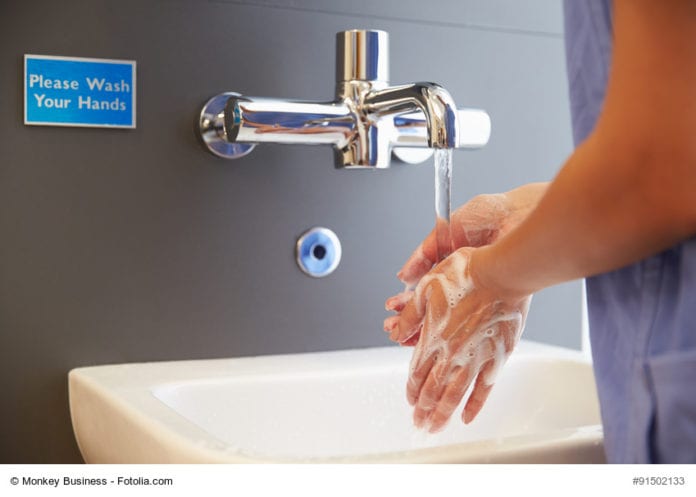Do you wash your hands as much as you should on the floor? New systems use a powerful emotion to make sure nurses and doctors do scrub up as often as they should: shame.
Biovigil is a badge worn by doctors and nurses that reminds them to wash their hands (and warns patients when they haven’t). The badge displays a yellow light and chirps when a person wearing it enters an exam room and hasn’t washed his or her hands. If the hands still go unwashed, the light turns red. Biovigil also collects hygiene data from all wearers to provide hospitals with overall sanitary records.
Another device, SwipeSense, calls itself “hand hygiene 2.0.” Instead of simply displaying whether or not the wearer washed his or her hands, the device clips on to a uniform and dispenses hand sanitizer.
These and other devices may combat the spread of bacteria in hospital settings, both in real-time and long-term. According to The Atlantic, less than half of healthcare workers wash their hands as often as they should.
Have you used these or similar devices? Would you wear them? Do you think nurses and doctors can–and should–be shamed into washing their hands? Share your thoughts below!
This article was republished with permission from SCRUBS Magazine.


According to research hand sanitizers do a better job of killing bacteria compared to washing with soap and water. At the two hospitals I work for the rule is that if one’s hands are visibly soiled, soap and water is indicated. For general hygiene the hand scrubs are recommended. And of course soap and water is always indicated if the patient has C-Diff. As a nurse, I never fail to use one or the other both entering and leaving a patient’s room. As a patient, I don’t care which type of hand hygiene medical personal use, as long as they use something effective. The only times that I have been tempted to skip hand hygiene is when we are so busy that everyone is screaming at us to take care of the item that they want right now to the neglect of every other patient need on the unit. That scenario can be avoided with appropriate staffing ratio’s allowing staff adequate time with each patient.
With all the focus on healthcare workers working smarter, not harder, I would like to see the evidence that shows washing your hands or squirting a bit of gel 163 times per day is more effective in preventing infection than say thoroughly washing your hands once per hour. How much of this is just for show and a cue to the patient(like I really care about you and know what I am doing). Not like that putz doc that just came in. Isn’t the anti microbial effect for a certain time?
It really is time to stop addressing this issue as what we all should be doing and put some new focus in place. How about random glow germ test with that black light with yearly evaluation input and a weighted percent for results?There is too much talk about what we medical professionals know we should be doing with no real way to introduce consequences for our care. Enough articles on if this gets done or not. More action with individual results and consequences. And positive input on compliance. If we place this long ongoing issue into the same category as we do drug doses, patient care in general etc., we’d be on to something. For years we just keep monitoring and having discussions. How about patient scores that reflect staff compliance for hand washing when it could be observed? Not just by infection control. (Industrial Nurse, ER Nurse, Paramedic.
As a patient and a long time nurse, I see very few wash their hands! Everyone uses the foam. They use it every time them enter or leave but I am old school, I really think you need to wash your hands if there is a sink there. To me the foam was for emergency situations where hand washing was not available…..am I just too old school?
I totally agree, usually the nurses only need a gentle reminder if they are forgetting. The doctor’s are another story and it is not just washing hands. My husband was in isolation for community acquired MRSA. A general surgeon came to look at the offending boil. He refused to wear PPE; and he refused to get protective eye glasses to lance this boil. I reported him to the medical director of the hospital, but I am guessing that nothing was done. I worried about the patients he saw after being in our room.
As a nurse of 25 years I don’t see many nurses forgoing hand washing in the healthcare setting. None of us want to be responsible for bringing illness and disease home to our families nor spreading bacteria from patient to patient.
After a recent in patient surgical stay I can share that my experience was a good number of rounding surgical residents entered my room and attempted to remove my surgical dressing without washing up at which point I directed them to the sink & soap at the entryway of my room. In fact the only physician that did wash their hands without prompting was my surgeon. No one cleaned their stethoscopes unless I requested it.
There is a serious disconnect here.
Housekeeping used a lot of the alcohol based hand washes.
I would be completely on board with using any device that increases good habits and decreases infection rates.